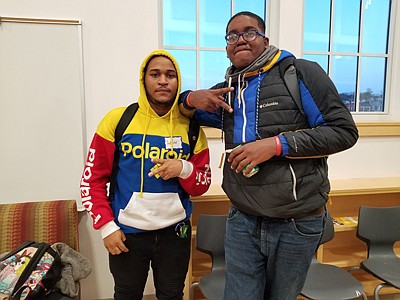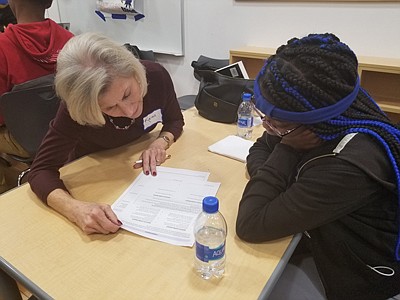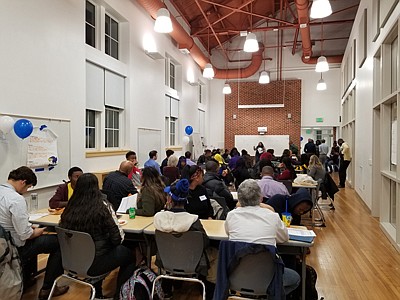A national college readiness program has launched in Baltimore to help underserved students make the grade. iMentor hosted its first meet and greet for the students of the Academy for College and Career Exploration (ACCE) and their mentors November 13, 2019 at the ACCE.
Nearly 80 mentors and students showed up for the event to connect through games, goal setting and conversation.
“We’re bringing in community members and professionals who have experienced the transition from high school to college or high school to adulthood and can invest in one student for a long time,” said Director of Mentor Engagement Shakira Smiler. “I think this is a unique mentoring model that I haven’t seen in other organizations. We get to bridge the gap between people who are passionate about supporting students but didn’t know how they could.”
Students and their mentors review their commitment to each other at the iMentor orientation at the Academy for College and Career Exploration.
iMentor is a national mentorship program that started in the South Bronx of New York City in 1999 by John Griffin, founder of Blue Ridge Capital and two colleagues Richard Buery and Matt Klein. So far, the program has paired over 33 thousand students with mentors nationwide.
iMentor opened in Baltimore in April. The organization officially launched services with ACCE and Baltimore Design School at the start of this school year. The program pairs high school juniors with a college graduate for three years in hopes of helping students graduate high school and prepare for college. iMentor said it expects 91 percent of their students will earn a college degree.
Amir Sydnor, a junior at ACCE high school from Northeast Baltimore, came to the event with classmates Antoine Anderson and Tyrah Corsey. The students were eager to meet their mentor and start building a relationship.
“I like that they match the people with what you like. I just feel like it’s a good fit, you can make a lot of connections,” said Sydnor.
iMentor said it is the opportunity to connect with positive people that makes the difference.
Sometimes there are not as many mentors at home to give students the extra push to continue especially if they may be dealing with tough circumstances.
“I want to go to college,” said Corsey. “Everyone should have this opportunity. I have issues that I want to work on and I feel as though my mentor is going to help me through that.”
After the program is over there are still opportunities for the relationship to continue. “After three years, students and their mentors are able to continue on formally through our Post-Secondary Program. A large group of mentors and mentees also stay in touch informally,” said Smiler.
Mentors and students share ideas about getting started at the iMentor orientation November 13, 2019 at the Academy for College and Career Exploration.
Mentor Sydney Short graduated from Baltimore City College and Johns Hopkins University. “Because of the mentorship I got at City, I very much wanted to give back to the next generation,” said Short. “I have been watching the success of iMentor in other cities and wanted to do my part to see if this could work in Baltimore.”
Mentors at the event expressed their gratitude to iMentor’s diligent background checks.
“The vetting process itself is pretty thorough” said Short. “There’s a whole application talking about our interests, and why you want to mentor. I really appreciate that, it shows that they care about the students success.”


